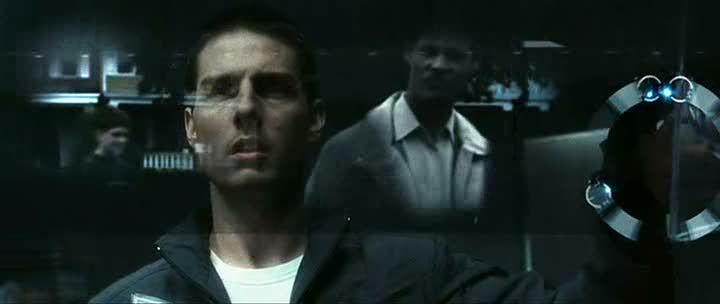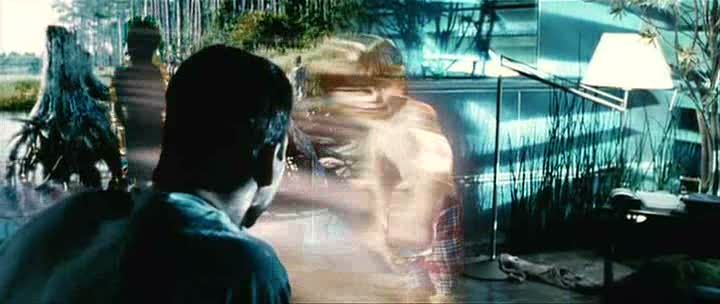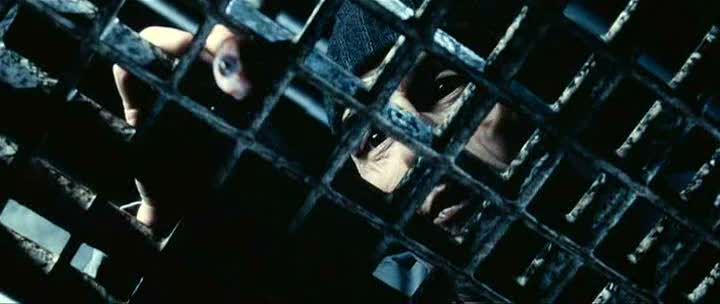
[This is a contribution to the Steven Spielberg Blogathon, hosted by Icebox Movies and Medfly Quarantine, running from December 18-28.]
It is fitting, and much remarked-upon, that for a film about seeing the future, eyes and vision are incredibly important to Steven Spielberg's Minority Report. The film literalizes the idea of seeing the future, removes the concept from the realm of the metaphysical and places it into the context of a gritty forensic police thriller. The future world it imagines, by way of Philip K. Dick, is one in which a trio of powerful precogs — savants with awesome mental abilities — are harnessed by the police department to prevent violent crimes before they happen. The precogs see — literally see — murders that are going to happen in the future, and their visions are harnessed through computers into video records that can then be played back, manipulated, and enhanced, their details thoroughly dissected by the precrime investigator John Anderton (Tom Cruise).
The business of cop shows, the sifting through of evidence and unearthing of clues, is translated into this futuristic milieu as Anderton analyzes these videos in order to discover the soon-to-occur murder's location and actors. Spielberg stages the introductory scene of Anderton leading an investigation as though the detective was conducting a symphony, using a complex computer system that responds to his every movement. He waves his hands and video fragments dash across the screen. Segments are looped and repeated, details are zoomed in on and snatches of sound are amplified, and every nuance of the video becomes a potential clue pointing towards the scene of the future crime. Detective work becomes a process of looking deeply and intently, examining the image — in other words, the detective becomes a figure analogous to a film editor, or perhaps a film critic, an analyzer of images, fitting together the bits and pieces of a scene in a way that makes sense and reveals the meaning of the scene.
The film's literalization of seeing the future is so potent because it's a metaphor or a model for the cinema, but even more poignantly it's compared to home movies. Anderton spends his days looking into the future, but his nights are spent immersed in the past, in home movie recordings of his young son, who disappeared and is presumed dead. We never say that we are seeing the past in the same way as we talk about seeing the future, but when we look at home movies or a photo album, we are in fact seeing the past, visually engaging with memories. When Anderton pulls up the footage of his son playing on the beach, selecting it from a larger collection like a connoisseur, he engages with it in much the same way as he does with the precogs' visions of the future: looping and rewinding, revisiting key passages as though hoping to extract some meaning, some tangible clue, from these images of his laughing, energetic son. It places Anderton's work in heartrending relief, as an effort to find the truth in these video images of the future, the truth that eludes and mystifies him when trying to make sense of the loss of his son through video records of the past.

The directive to look, to see deeply, is also central to the character of Agatha (Samantha Morton), the most powerful of the precogs. Agatha wants a witness, wants someone to look closely at a particular vision of hers, a vision of a crime that has long been thought "solved," the murder prevented before it happened. Agatha's quest becomes linked to Anderton's when Anderton sees himself in one of the precogs' visions, and sees his own name come up as the next would-be murderer for the police to apprehend. Anderton is forced to go on the run, eventually joined by Agatha, who he liberates from her weird imprisonment in the tanks that house the precogs and make them look like exhibits at an aquarium, an aspect of the whole precog system that everyone seems, curiously, morally blind to until Anderton rips Agatha out of this housing and is forced to confront her humanity.
That moral blindness is another form of seeing and not seeing, the motif that Spielberg seems fascinated with here. Is it really possible that this future society is so indifferent to the humanity of the precogs that a system where these people are permanantly chained, physically and mentally, to a computer system that channels their visions, is not only accepted but is soon to be unveiled on a larger scale? Before Anderton goes on the run, he and his fellow cops make some nods to the moral and philosophical dilemmas at the root of precrime — how do you arrest someone for a crime that hasn't actually occurred? — but they easily shake off the deeper doubts of FBI agent Danny Witwer (Colin Farrell), dismissing his concerns as inconsequential whining. In (broad) contemporary political terms, Witwer is the bleeding-heart liberal concerned with rights and morality, while the rest of society seems poised to side with the law-and-order conservatives who view the sacrifice of these abstract values and ideals as secondary to the gains of preventing murders. Spielberg never taps too deeply into this subcurrent of the story, but it's there nevertheless, teasing just below the surface.
Instead, there's a lot more fun with eyes and seeing. Anderton, grieving for his son, buys his drugs from an eyeless man whose hollow, empty sockets unseeingly bore into the center of the suffering Anderton. Later, he goes on the run but his eyes identify him wherever he goes. In this future society, eyescans are so routine that even advertisements scattered around on billboards scan the eyes of passersby in order to target spoken ads at individuals. As a result, wherever Anderton goes, his name is being shouted out amidst cheery slogans; Big Brother sees him everywhere because big companies see him everywhere. There's something to be said here, probably, about the reversal of the usual couch potato dynamic of consumers staring at ads. Now the ads stare back, and get personal, the logical outgrowths of online ad targeting and spyware. Spielberg, again, doesn't really go there, just leaves it as intriguing loose thread. For him, the eyescans are a plot device, necessary to give Anderton an obstacle to overcome.

This problem results in the ingenious sequence where Anderton goes to a disreputable doctor who gives him an eye transplant, which in this society where eyes are the windows not only to the soul but to one's entire person, is the equivalent of a new name and a new identity. Spielberg stages a brilliant sequence where the blind and blindfolded Anderton, who has to shield his eyes for some time after the surgery, is forced to hide from an army of spider-like miniature police robots. Spielberg's camera follows the robots on their skittering journey through the dilapidated building where Anderton is hiding, the camera seeming to creep through walls, finally arriving at the room where Anderton tries to slow his pulse and hide his breathing by submerging himself in cold water, before being forced to reveal his new eyes for the robots to scan.
All of this is set-up and preparation for the film's best gag, the slapstick chase sequence between Anderton and his own eye, a slippery connection to his past identity that he finally holds onto by the barest thread. Literally. This sense of humor — black, grisly, sometimes positively naughty as in Anderton and Agatha's visit to a virtual reality sin palace — enlivens the film, as does Spielberg's predictably fluid action staging. Minority Report is tense and visceral, balancing man-on-the-run suspense with bursts of action and those moments of piquant humor that give this dark film a surprisingly playful sensibility.
The finale drives home the film's multiple takes on seeing — to see the future, to see the truth, and not always at the same time or in the same sense — while first imprisoning Anderton in a way that mirrors the fates of the precogs at the beginning of the film, then unleashing him for the climax. Spielberg, as always, can't resist tying things up for the finale, resolving the darker undercurrents of the film in a tidy denouement where the bad guy is caught, the precog program ended, and everything set right. The rest of the film raises unsettling propositions about justice and morality: that justice could miscarry; that the illusion of moral certitude is just that, an illusion; that predicting the future can be the same as creating it, as Anderton is, paradoxically, set on the path to murder by the prediction that he would commit a murder. The film's ending tiredly suggests a more benign justice that will, eventually, win out in the end, but the torturous, unlikely machinations required to reach this happy ending only wind up enforcing the limitations of justice and law. Spielberg, no matter how hard he tries, can't erase the disquieting implications of his own film, and Minority Report is all the richer for this final lingering tension.







0Awesome Comments!